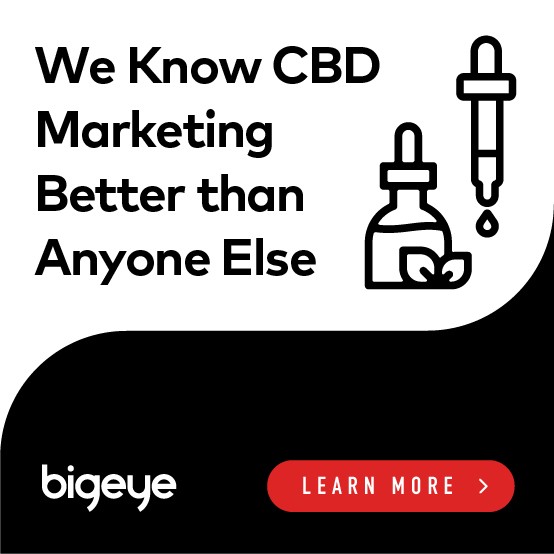
In a head-spinningly short period of time, cannabidiol (CBD) has gone from an ultra niche product to a global craze. Walk down any supermarket, pharmacy or gas station aisle, and you’re likely to see racks and racks of CBD-based products.
And that presents quite a significant challenge for CBD marketing specialists.
Not only do CBD product marketers have to adapt to a rapidly evolving marketplace, they also have to:
- Negotiate changing regulatory standards
- Deal with inconsistent advertising and marketing industry practices
- Find a way to differentiate their products amid a sea of competition
It’s a steep challenge — but the rewards make it a worthwhile one. The CBD market — worth only a few million in 2014 — is expected to be worth $20 billion by 2024. In order to take advantage, however, you need to understand the market at a deep level — and you need a well-executed CBD marketing strategy.
Understanding the CBD Market
Before you can effectively market CBD, you need a grounding in the subject, as the laws governing cannabidiol have changed dramatically in recent years.
CBD is a byproduct of the hemp plant. Unlike cannabis, another hemp byproduct, CBD is non-intoxicating and non-psychoactive. The compound in cannabis that causes feelings of intoxication, THC, is present in much lower concentration in CBD. This means that consumers can ingest CBD products therapeutically anywhere and at anytime, and feel no intoxicating effects.
Despite CBD’s non-intoxicating status, it was consigned to a murky gray area in terms of legality for much of its existence, given its relationships to hemp and cannabis, which were both broadly illegal for many years. That changed, however, with the passage of the 2018 Farm Bill.
That bill legalized hemp production for the first time under federal law. It also legalized the production of CBD, as long as that CBD does not contain THC levels above a certain threshold. This, for the first time, opened the door to production and sale of CBD products on a mass scale. And that’s precisely what happened, as large corporations entered the CBD space in force, turning the product from a niche concern to an overnight consumer phenomenon.
That story, however, leaves one critical aspect unaddressed: Why was the consumer market so fascinated with CBD in the first place?
A Health and Wellness Craze
If marketing has taught us one thing over the last two decades, it’s this: Consumers are perpetually seeking natural alternatives to make them look and feel better. CBD, much like kale, quinoa and gluten-free, had everything necessary to become a consumer wellness craze. It was readily available, fairly inexpensive, natural and backed by some significant research attesting to its efficacy.
CBD was soon marketed as a natural antidote to anxiety, depression, pain, insomnia — all of the modern maladies that bedevil large segments of the consumer base. Now, CBD use is regarded by some as a natural, non-habit forming alternative to pharmaceuticals.
Consumers have also come under the increasing belief that what’s good for them is good for their pets. CBD-infused animal products are the fastest-growing segment within the pet industry, as consumers extend their passion for natural health and wellness alternatives to their pets.
Understanding the Challenges Inherent to Marketing in the CBD Space
Given what we’ve covered thus far, you can hardly blame companies for getting excited above the opportunity presented by CBD. It’s a newly legal product, with extraordinary public demand, that fits squarely into one of the most enduring passions (natural health and wellness products) of the U.S. consumer. Yet while the opportunity is undeniably ripe, there are some significant challenges to negotiate.
First, there are restrictions regarding what can and can’t be said when marketing CBD products, For example, brands cannot make “deceptive” claims about the health and wellness benefits of CBD. Any ad copy positioning CBD as some kind of miracle cure is almost certainly going to draw the attention of the Food and Drug Administration, the agency tasked with regulating CBD marketing.
When marketing their CBD products, brands must also be careful to avoid making specific claims about treating diseases or conditions with CBD products. This, of course, should be the province of a physician. In order to stay on the right side of regulators, CBD marketers should talk about the health and wellness benefits of CBD in broad terms and rely on substantiated information. Fortunately, a plethora of legitimate scientific research exists attesting to the probable benefits of CBD in a range of ailments. Brands should rely on established studies and avoid hyperbolic medical claims.
Understanding what can and cannot be said is only one part of the equation of course. The avenues through which a brand can market CBD products are also constricted. Many marketing channels that are open to conventional products are closed to CBD products. This includes some of the most prominent players in the digital advertising space. Google, for example, does not allow advertising and marketing of CBD products. Twitter, too, bans CBD ads.
All is not lost, however. Snapchat still allows CBD marketing. Facebook and Instagram had rigorous restrictions in place on CBD marketing but recently eased these restrictions and re-opened their platforms to CBD ads. There are CBD-industry specific digital ad platforms that can be used to reach audiences, even if they may not have the reach of Google. The truth is that these restrictions, while an irritant, are not a formidable obstacle. CBD use has grown exponentially based on little more than word of mouth and positive press coverage.
Yet these restrictions do raise another important point: How do marketers sell their products when there are countless brands, they all do the same thing and some of the largest conventional marketing channels are closed?
Let’s take a closer look at some CBD marketing strategies you can employ to stand out from the wall of competition within the CBD space.
Core CBD Marketing Strategies
- Develop a targeted brand strategy. Many CBD brands struggle with differentiation, given the nature of the product and the number of competitors in the space. CBD marketers can effectively differentiate by going after a specific audience with the larger CBD market. Feals, for example, positions its products as high-end consumer health supplements. They come delivered to consumer homes in tasteful boxes, are packaged in pre-measured doses and consumers with questions can contact the company’s “CBD concierges.” This positioning is a long way from a CBD product sold in a gas station with cliched, cannabis-style branding.
- Employ SEO best practices. In an industry where it is difficult to differentiate, SEO becomes even more critical. Marketers should devote significant resources to search optimization, keyword research, link building, etc. If consumers aren’t being swayed by branding, they are more likely to engage with whatever ranks the highest.
- Stay on top of evolving industry regulations and practices. As mentioned above, digital advertising within the CBD space comes with a variety of restrictions attached. Yet this is quickly shifting. Facebook announced it would soften its stance in June 2019, and it’s very likely that other major players in the space will follow suit. Marketing and advertising in the CBD space has been slowed by uncertainty over its legal status (while CBD is federally legal, its status in some individual states remains unclear). As this uncertainty shakes out, CBD marketers will gain greater access to conventional channels. By monitoring this closely and staying on top of changes, CBD marketing specialists can act quickly and decisively.
- Develop a smart content marketing plan. While there is widespread consumer interest in CBD, the fact remains that most people know very little about the subject. They may have concerns about CBD being intoxicating or illegal, even though neither may be true. A smart content marketing strategy centered around education and awareness can help educate consumers. It can also drive traffic to your web properties and social media accounts, burnish your brand credentials and improve your search ranking. This means that a smart, compelling content marketing strategy is an essential piece of any CBD product marketing strategy.
Finding the Right CBD Marketing Agency
At BIGEYE, we are true domain experts in CBD marketing. We’ve been helping CBD brands develop cutting-edge, tech-forward CBD marketing campaigns for years — and we have the experience and expertise to help you take your CBD campaign to the next level.
Contact us today to learn more about what BIGEYE can do for you.



